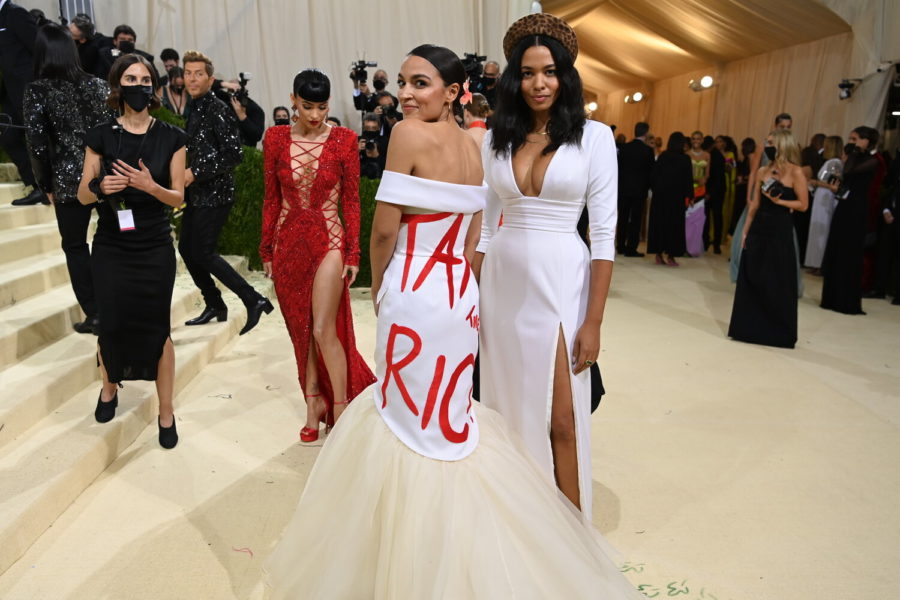The 2021 Met Gala: Is the backlash warranted?
Courtesy of Nina Westervelt/The New York Times
The Met Gala: a night of high fashion or performative activism?
September 24, 2021
The criticisms of the 2021 Met Gala were somehow both predictable and wide-ranging, just like the outfits themselves. While some were disappointed by the actual fashion and the inability of celebrities to stick to a theme, others made accusations of performative activism and took digs at influencer culture, with several social media stars landing tickets to this year’s event.
Let’s start with the main point of the Met Gala: the clothes. The theme this year was ‘In America: A Lexicon of Fashion’, a broad category that lends itself to various interpretations. Emily Blunt, Gemma Chan and Yara Shahidi emulated looks from Old Hollywood stars; Hedy Lamarr, Anna May Wong and Josephine Baker, respectively. Some pulled inspiration from various decades, such as Lil Nas X in a ‘70s-esque disco jumpsuit, and others from social causes, like Dan Levy’s outfit adapted from works by queer artist and activist David Wojnarowicz. However, most of the attendees chose to take the easy way out and wore pieces made by American designers as their contribution to the theme. This meant that some outfits weren’t instantly recognizable as a part of “American Fashion.” Kim Kardashian essentially wore a morph suit, Kendall Jenner went as British actress Audrey Hepburn and Billie Eilish (whose dress I actually loved) claimed to channel Marilyn Monroe in an Oscar de la Renta ball gown, even though Marilyn preferred form-fitting dresses. Although almost everyone looked nice on their own, and I disagree with most of the critiques of the individual ensembles; I’ll admit that the overall effect on the beige carpet was not as impactful as it was in years past. But this issue falls more on the shoulders of Anna Wintour and the Metropolitan Museum of Art, who chose the needlessly vague theme, not their guests.
The night also caused quite a number of political controversies. Outrage ensued after Congresswoman Alexandria Ocasio-Cortez (AOC) wore a dress emblazoned with the message “Tax the Rich” on the back in bright red letters, an odd message for an event where tickets reportedly cost $30,000 each. Many were not pleased by the irony and condemned her fraternizing with the same people she claimed to oppose, even though AOC did not have to buy her own ticket since she was invited and has frequently advocated for supporting the arts. Of course she would attend an event that raises money for the Met’s Costume Institute—it’s part of her platform. And AOC was not the only one wearing political messages. Megan Rapinoe’s purse read “In Gay We Trust,” and “Peg the Patriarchy” adorned model Cara Delevingne’s vest. These statements can feel especially meaningless to the people watching along at home, quick shots of celebrities checking off their activism box to fit the newer, hipper version of American fashion being displayed for the world to see. And when you take into account the actual Black Lives Matter protesters who were arrested just outside the museum that night, the juxtaposition is downright sad. The online outrage is more than understandable.
The final main criticism of this year’s Met Gala centered around some of the newer invitees. In addition to the four Gen-Z hosts (Timothée Chalamet, Billie Eilish, Naomi Osaka and Amanda Gorman), TikTok stars Addison Rae and Dixie D’Amelio were in attendance, as well as YouTuber Emma Chamberlain. Whether or not social media influencers counted as celebrities, especially ones prestigious enough to be vetted by Anna Wintour and invited to the Met, is an open question. Ironically enough, most backlash came from Twitter and other social media platforms. I’m always happy to see our generation dominate new spaces, and I don’t mind the inclusion of online personas into celebrity culture. If these times are a-changin’, then let them. However, I was a tiny bit disappointed that none of the latter three even tried to follow the theme or wear anything remotely exciting. If your entire brand is built around directing trends, it was weird to see none of them even trying to do so.
So is the criticism of this year’s Met Gala warranted? For the fashion, probably not. It’s easy to judge from afar, and this year’s theme was especially hard to dress for considering how open-ended it was. But for the more serious issues, it’s hard to say. I’m not for putting the blame on any individuals, but it’s clear that performative activism continues to be a problem for all, but especially in the glitzy, detached, high-fashion world of celebrities and influencers. Hopefully next year’s continuation of the theme, “In America: An Anthology of Fashion,” which will focus on inclusion and diversity, fosters more genuine support for social issues and the people affected by them. And perhaps it’ll also have better clothes.




